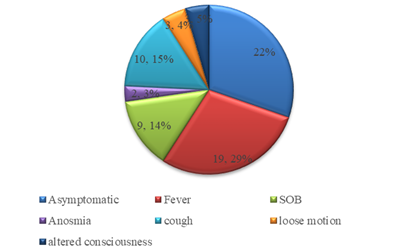Cancer Treatment Delay Due to COVID-19 Infection in Cancer Patients Attended in a Tertiary Hospital of Bangladesh
Abstract
Introduction: The COVID-19 pandemic had a significant impact on health care systems worldwide. However, the brunt of this impact was on the cancer patients getting treatment in specialized oncology hospitals. Objective: to assess the cancer treatment delay due to covid-19 infection in cancer patients attended in a tertiary hospital of Bangladesh. Methods: It was a retrospective observational study and data of all patients dept. of Radiation Oncology, Combined Military Hospital (CMH), Dhaka, Bangladesh from July to December 2020 with cancer or history of cancer with COVID-19 was collected from interview of patient or attendant and medical records in a preformed data collection sheet and then analyzed. Results: Total 60 patients included were divided into two groups elderly population (>65 year) and younger population, the mean age of patient at diagnosis was 50 years, ranging from 28 to 72 years old, only 10 patients were aged 65 years or more. The most common co morbid condition associated was HTN followed by diabetes mellitus, IHD, bronchial asthma and cerebrovascular accident, patients with multiple co morbidities (26%) were also present in this study. Symptomatic analysis revealed most of the patient diagnosed asymptomatically (32%) and among symptoms fever (28%), shortness of breath (13%) and cough (15%) were the most frequent ones, patients also presented with anosmia, loose motion or altered consciousness. Haematologic and biochemical finding of COVID-19 infected patients shows most of the patients had anaemia (45%) and lymphopaenia (50%) in CBC, hyponatraemia (65%) as electrolyte imbalance and also increased D dimer (85%), raised Ferritin (55%) and high CRP (65%) in biochemical parameter. The most prevailing cancers was breast cancer, Head neck region (larynx, pharynx, oral cavity), Gastrointestinal tract (GIT inc. esophagus, stomach, colorectal) followed by lung, gynecologic, central nervous system (CNS), genitourinary tract, lymphoma and carcinoma unknown primary (CUP). Most of the patients received combined modality treatment including surgery, radiotherapy and chemotherapy. Patients delay in attending oncologist, delay or gap in initiation and continuation of cancer treatment like surgery, radiotherapy or chemotherapy occurred in most of the patients, the average gap of treatment due to COVID-19 infection was 3 months with a minimum gap of 10 days to extending upto 8 months. Conclusion: In conclusion, COVID-19 positivity during the scheduled radiotherapy treatment course chemotherapy and surgery has caused treatment delays. Multiple patient factors, such as race and ethnicity, underlying primary malignant neoplasms, multimorbidity, geographic location, receipt of COVID-19 vaccine, severity of COVID-19, and timing of COVID-19 diagnosis, were associated with delays in cancer treatment.
Downloads
References
Al Shamsi HO, Alhazzani W, Alhuraiji A et al. A practical approach to the management of cancer patients during the novel coronavirus disease 2019 (COVID-19) pandemic: an international collaborative group. The oncologist. 2020 Jun; 25(6): e936.
Mortality Analyses". Johns Hopkins University, Coronavirus Resource Center. Available at https://coronavirus.jhu.edu.
World Health Organization. WHO Director-General’s opening remarks at the media briefing on COVID -19, March 11, 2020. Available at https://www.who.int/dg/speeches/detail/who-director-general-s-opening-remarks-at-the-media-briefing-onCOVID-19-11-march-2020. Accessed March 11, 2020.
World Health Organization. Coronavirus disease 2019 (COVID -19): Bangladesh situation reports -24, Available at https//www.who.int/Bangladesh/emergencies/Coronavirus-disease-(Covid 19)-update/Coronavirus-disease-(Covid 2019)-bangladesh-situation- reports.
Liang W, Guan W, Chen R et al. Cancer patients in SARS-CoV-2 infection: A nation wide analysis in China. Lancet Oncol 2020; 21: 335-37.
Dai M, Liu D, Liu M et al. Patients with cancer appear more vulnerable to SARS-CoV-2: a multicenter study during the COVID-19 outbreak. Cancer discovery.2020 Jun 1; 10(6): 783-91.
Zhang L, Zhu F, Xie L et al. Clinical characteristics of COVID-19 infected cancer patients: a retrospective case study in three hospitals within Wuhan, China. Annals of oncology. 2020 Jul 1; 31(7): 894-901.
Kuderer NM, Choueiri TK, Shah DP et al. Clinical impact of COVID-19 on patients with cancer (CCC19): a cohort study. The Lancet. 2020 Jun 20; 395(10241): 1907-18.
Bray F, Ferlay J, Soerjomataram I, Siegel RL, Torre LA, Jemal A. Global cancer statistics 2018: GLOBOCAN estimates of incidence and mortality worldwide for 36 cancers in 185 countries. CA Cancer J Clin. 2018; 68: 394-424.
Tian J, Yuan X, Xiao J et al. Clinical characteristics and risk factors associated with COVID-19 disease severity in patients with cancer in Wuhan, China: a multicentre, retrospective, cohort study. The Lancet Oncology. 2020 Jul 1; 21(7): 893-903.
Zheng RS, Sun KX, Zhang SW, Zeng HM, Zou XN, Chen R. Report of cancer epidemiology in China, 2015. Zhonghua Zhong LiuZa Zhi 2019; 41:19-28.
Rodriguez-Morales AJ, Cardona-Ospina JA, Gutierrez-Ocampo E et al. Clinical, laboratory and imaging features of COVID -19: A systematic review and meta-analysis. Travel medicine and infectious disease. 2020 Mar 1; 34: 101623.
Fyles A, Keane TJ, Barton M et al. The effect of treatment duration in the local control of cervix cancer. Radiother Oncol. 1992; 25 :273-27
Passamonti F, Cattaneo C, Arcaini L, et al; ITA-HEMA-COV Investigators. Clinical characteristics and risk factors associated with COVID-19 severity in patients with haematological malignancies in Italy: a retrospective, multicentre, cohort study. Lancet Haematol. 2020;7(10): e737-e745.
Dai M, Liu D, Liu M, et al. Patients with cancer appear more vulnerable to SARS-CoV-2: a multicenter study during the COVID-19 outbreak. Cancer Discov. 2020;10(6):783-791.
Mileham KF, Bruinooge SS, Aggarwal C, et al. Changes over time in COVID-19 severity and mortality in patients undergoing cancer treatment in the United States: initial report from the ASCO Registry. JCO Oncol Pract. 2022;18(4):e426-e441.
Riera R, Bagattini AM, Pacheco RL, Pachito DV, Roitberg F, Ilbawi A. Delays and disruptions in cancer health care due to COVID-19 pandemic: systematic review. JCO Glob Oncol. 2021; 7:311-323.
Van Marcke C, Honoré N, van der Elst A, et al. Safety of systemic anti-cancer treatment in oncology patients with non-severe COVID-19: a cohort study. BMC Cancer. 2021;21(1):578.
Ben Mustapha S, Simoni P, Dubois N, et al. The COVID-19 status of patients is an essential determinant for decision-making by radiation oncologists: A European survey. Cureus. 2022;14(3): e22842.



























